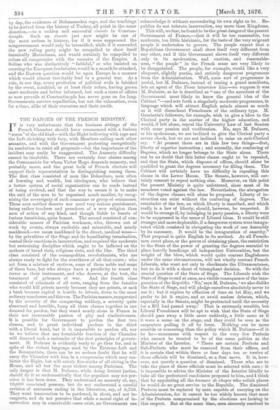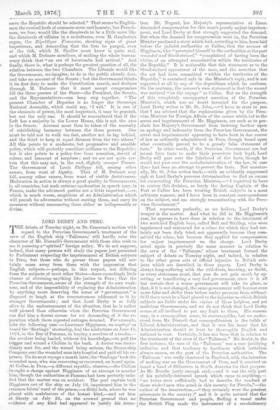THE DANGER OF THE FRENCH MINISTRY.
TT is very unfortunate that the business sittings of the 1 French Chamber should have commenced with a furious "scene " of the old kind—with the Right bellowing with rage and the Left shrieking with fury, with Members calling each other assassins, and with the Government protesting energetically its resolution to resist all proposals—but the importance of the incident may easily be exaggerated. The Amnesty difficulty cannot be insoluble. There are certainly four classes among the Communists for whom Victor Hugo demands amnesty, and probably more, and the great bulk of French electors will support their representatives in distinguishing among them. The first class consisted of men like Delescluze, men often of learning and wealth, but ideologues, who believe that a better system of social organisation can be made instead of being evolved, and that the way to secure it is to make the unit of the area to be organised much smaller, by recog- nising the sovereignty of each commune or group of communes. These men neither deserve nor need very serious punishment, being rather teachers and preachers of a new religion than men of action of any kind, and though liable to bursts of furious fanaticism, quite honest. The second consisted of con- siderable masses of Parisian workmen, who, thrown out of work by events, always excitable and miserable, and nearly maddened—we mean maddened in the direct, medical sense— by the privations of the Siege and its humiliating termination, vented their emotions in insurrection, and required the moderate but restraining discipline which ought to be inflicted on the authors of bread riots, religious riots, and the like. The third class consisted of the cosmopolitan revolutionists, who are always ready to fight for the overthrow of all that exists ; who act from a mixture of motives, some of them noble and some of them base, but who always have a proclivity to resort to terror as their instrument, and who deserve, at the best, the treatment of prisoners of war. And the fourth class consisted of criminals of all sorts, ranging from the fanatics who would kill priests merely because they are priests, or sack a bank because capital is hostile to labour, down to the most ordinary murderers and thieves. The Parisian masses, exasperated by the severity of the conquering soldiery, a severity quite abnormal and horrible, lump all these classes together in one demand for pardon, but they stand nearly alone in France in their not inexcusable passion of pity and vindictiveness. It is possible for Government to pardon the first two classes, and to grant individual pardons in the third with a liberal hand, but it is impossible to pardon all, nor do we believe that any formidable fraction of the Chamber will demand such a surrender of the first principles of govern- ment. M. Dufaure is evidently ready to go thus far, and in spite of the violent language used by the Extreme Left and the Bonapartists, there can be no serious doubt that he will carry the Chamber with him in a compromise which may em- bitter the Right, but will satisfy five-sixths of all sitting in the House, and all but the most violent among Parisians. The only danger is that M. Dufaure, while doing lenient justice, should do it so undramatically that the populace may not per- ceive it has been done. They understand an amnesty of, say, 10,000 convicted persons, but do not understand a careful revision of sentences ending in the liberation, say, of 5,750. They want insurrection to be pardoned, in short, and not in- surgents, and do not perceive that while a moral right of in- surrection may in conceivable cases exist, no Government can acknowledge it without surrendering its own right to be. Re- publics do not tolerate insurrection, any more than Kingdoms.
This will, we fear, be found to be the great danger of the present Government of France,—that it will be too reasonable, too moderate, too little histrionic, for the taste of the very exigeant people it undertakes to govern. The people expect that a Republican Government shall show itself very different from any other, and if this Government shows itself very different only in its moderation, and caution, and reasonable- ness, " the people " in the French sense are very likely to be disappointed. The people, for example, would like a very eloquent, slightly poetic, and entirely dangerous programme from the Administration. Well, some sort of programme is useful, but M. Dufaure, instead of issuing a grand manifesto, lets an agent of the Times interview him—we suppose it was M Dufaure, as he is described as "one of the members of the Government most likely to know the general idea of the Cabinet "—and sets forth a singularly moderate programme, in language which will attract English minds almost as much as it will disenchant Frenchmen of the ordinary type. IL Gambetta's followers, for example, wish to give a blow to the Clerical party in the matter of the higher education, and would, if left alone, repeal the University Law of last Session with some passion and vociferation. No, says M. Dufaure, or his spokesman, we are inclined to give the Clerical party a severe check, but we are not inclined to raise an anti-Clerical cry. " At present there are in this law two things—first, liberty of superior instruction ; and secondly, the conferring of Degrees, which no longer belongs to the State alone. There can be no doubt that this latter clause ought to be repealed, and that the State, which disposes of offices, should alone be qualified to grant the degrees necessary for filling them. The Cabinet will certainly have no difficulty in repealing this clause in the Lower House. The Senate, however, will cer- tainly consent to repeal nothing else. Moreover, on this point the present Ministry is quite unfettered, since most of its members voted against the law. Nevertheless, the abrogation of the degree clauses will alone be proposed. Liberty of in- struction can exist without the conferring of degrees. The remainder of the law, on which liberty is inscribed, and which really is a law of liberty, should, however, be respected. It would be strange if, by indulging in party passion, a liberty were to be suppressed in the name of Liberal ideas. It would be still stranger and more deplorable, if a dangerous system were inaugu- rated which consisted in abrogating the work of one Assembly by its successor. It would be the inauguration of anarchy." That proposal is quite English in its method. As all French- men covet place, or the power of obtaining place, the restriction to the State of the power of granting the degrees essential to place heavily handicaps all independent Universities, but the weight of the blow, which would quite content Englishmen under the same circumstances, will not wholly content French Liberals, who want not only to checkmate the Ultramontanes, but to do it with a shout of triumphant derision. So with the crucial question of the State of Siege. The Liberals wish the State of Siege to end at once, as a visible consequence of the inau- guration of the Republic. No,' says M. Dufaure, we also dislike the State of Siege, and will pledge ourselves absolutely never to use it ; but it expires by effiuxion of time on let May, and we prefer to let it expire, and so avoid useless debates, which, especially in the Senate, might be protracted until the necessity for a Bill had passed away.' That is extremely sensible, but Liberal Frenchmen will be apt to wish that the State of Siege should pass away a little more suddenly, a little more as if it were a scene on the stage, and they could be seen as the carpenters pulling it off by force. Nothing can be more sensible or reassuring than the policy which M. Dufaure—if it be he—announces with respect to the very few Prefects who cannot be trusted to be of the same politics as the Minister of the Interior. " There are certain Prefects and Sub-Prefects who must be removed from their offices, and it is certain that within three or four days ten or twelve of these officials will be dismissed, as a first move. It is, how- ever, not merely a question of dismissal. Those who are to take the place of these officials must be selected with care ; it is impossible to advise the Minister of the Interior blindly to take all the prefectoral candidates proposed to him, and I think that by appointing all the buveurs de chopes who solicit places he would do no great service to the Republic. The dismissed Prefects must be replaced by men capable of carrying on the Administration, for it cannot be too widely known that most of the Prefects compromised by the elections are lacking in this respect. But at the same time, men sincerely resolved to serve the Republic should be selected." That seems to English- men the counsel both of common-sense and honesty, but French- men, we fear, would like the dismissals to be a little more like the dismissals of villains in a melodrama, even M. Gambetta's organ, the Re'publique Francaise, showing signs of great impatience, and demanding that the lists be purged, even at the risk, which M. Spuller must know is quite real, and which M. Dufaure mentions, of making the whole bureau. cracy think that " an era of hecatombs had arrived." And t finally, there is, what is perhaps the greatest question of all, the relation between the two Chambers. The Liberals would like the Government, we imagine, to do as the public already does, and take no account of the Senate ; but the Government thinks it its first duty to make the Constitution march, and declares through M. Dufaure that it must accept compromises till the three powers of the State—the President, the Senate, and the Representatives—can keep step together. " The present Chamber of Deputies is no longer the Sovereign National Assembly, which could say, ' I will.' It is one of the elements of power, the most important, it may be granted, but not the only one. It should be remembered that if the Left has a majority in the Lower House, this is not the case in the Senate. Account must then be taken of the necessity of establishing harmony between the three powers. One must be told not to walk too fast, another not to lag behind, and the third to keep at equal distance from the two others." All this points to a moderate, but progressive and sensible policy, which will probably conciliate millions to the Republic; but it also points to a policy free from sensation, devoid of colour, and innocent of surprises ; and we are not quite cer- tain that this may not, in the end, slightly ennuyer France. The Government of Louis Philippe fell, among other causes, from want of dignity. That of M. Dufaure may fall, among other causes, from want of visible decisiveness. Moderation in action is always a good quality in Governments, in all countries, but such extreme moderation in speech may, in France, make the advanced parties not a little impatient,—or, which is much worse, suspicions of an Administration which will punish its adversaries without cursing them, and carry its measures without announcing them either as indispensable or divine.



































 Previous page
Previous page